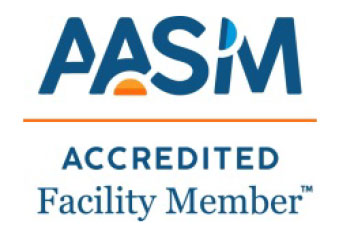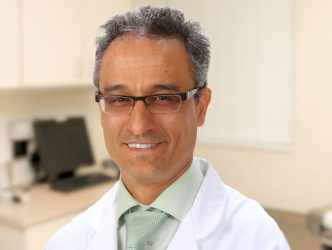Chronic sleep issues can negatively affect your daily well-being. If left untreated, they can also lead to serious medical conditions such as high blood pressure, memory loss, headaches, heart problems, excessive sleepiness during the day, and even stroke.
Why Choose Trinity Health Sleep Center?
 The Trinity Health Sleep Center offers comprehensive services including office visits, follow-up visits, and sleep studies. Patients benefit from our advanced technology, contemporary facilities with private rooms, and a comfortable, relaxing environment for overnight studies. Our multi-disciplinary team includes board-certified sleep medicine specialists and highly skilled sleep technologists. We are there for you day and night to guide you through all testing, and results are reported to your referring physician promptly.
The Trinity Health Sleep Center offers comprehensive services including office visits, follow-up visits, and sleep studies. Patients benefit from our advanced technology, contemporary facilities with private rooms, and a comfortable, relaxing environment for overnight studies. Our multi-disciplinary team includes board-certified sleep medicine specialists and highly skilled sleep technologists. We are there for you day and night to guide you through all testing, and results are reported to your referring physician promptly.
Conditions Treated
The most common sleep disorders treated at Trinity include the following:
- Insomnia: The perception or complaint of not enough or poor-quality sleep
- Narcolepsy: A chronic sleep disorder characterized by excessive or overwhelming daytime tiredness, even after an adequate amount of sleep. Other symptoms include the sudden loss of strength in the muscles, sleep paralysis, and hallucinations occurring while falling asleep or upon waking
- Parasomnia: A type of sleep disorder characterized by sudden awakening during various stages of sleep. Examples include night terrors, sleep walking, and sleep talking
- Periodic Limb Movements in Sleep: Repetitive movements, typically in the legs, that occur about every 20–40 seconds. The limb movements can fragment sleep and cause severe daytime sleepiness
- Restless Leg Syndrome: Experiencing unpleasant sensations in the legs described as creeping, crawling, tingling, pulling, or painful. These sensations usually occur in the calf area but may be felt anywhere from the thigh to the ankle. Restless legs can make it very difficult to fall asleep
- Sleep Apnea: A potentially life-threatening disorder characterized by brief interruptions of breathing during sleep. These episodes can occur as often as several hundred times a night and eventually lead to heart attack, stroke, high blood pressure, and/or accidents caused by falling asleep while driving or on the job. Treatment options include lifestyle changes, surgery, and/or use of a Continual Positive Airway Pressure (CPAP) device. Learn more at KeyCare Medical
Sleep Studies
A sleep study is an overnight, non-invasive exam considered to be the gold standard for accurately diagnosing sleep disorders. This type of test takes place in a sleep center or hospital and allows the specialists to see what happens in your brain and body during sleep.
At Trinity Health, our board-certified sleep medicine physician and sleep technicians employ the latest technology to monitor various brain activities and body systems then analyze the results and provide the referring doctor with a timely report.
Brainstem Auditory Evoked Potential (BAEP) evaluates the nerve pathway from the ear through the brainstem and provides information regarding hearing integrity and brainstem function. It is also useful in diagnosing acoustic neuromas and multiple sclerosis.
Types of Sleep Studies
- Polysomnography (PSG) is an overnight test that measures multiple variables during sleep, including airflow through the nose and mouth, blood pressure, electrocardiographic activity, blood oxygen level, brain wave patterns, eye movement, and the movement of respiratory muscle and limbs. We also observe the patient’s sleep stages and body positions throughout the night.
- Multiple Sleep Latency Test (MSLT), also called a “nap study,” measures how quickly a person falls asleep during the day. Brain waves, heartbeat, eye, and chin movements are recorded and analyzed to identify the patient’s level of daytime sleepiness. This study also evaluates how quickly and how often the person enters the rapid-eye-movement (REM) stage of sleep.
- Maintenance of Wakefulness Test (MWT) is a daytime polysomnographic procedure which measures the patient’s ability to stay awake and the effectiveness of any prescribed therapy.
Preparing for Your Sleep Study
- Once a sleep study is deemed necessary by our team, we work together to schedule an overnight visit to the sleep center.
- During the time period before your appointment, try to follow your normal sleep routine and keep a sleep journal if requested by the doctor.
- On the day of your sleep study, take any medications that you usually take – unless otherwise directed by the sleep specialist.
- Do not take any naps, as they may interfere with your study. Eat and drink like you normally do, but avoid caffeinated foods and beverages, and alcoholic beverages after 12 noon
- Before you come to the sleep center, eat dinner, shower and wash hair to remove any styling products or hairspray, remove make-up, lotions, oils, and any other product that goes on the skin
What to Bring
You will have a private room and bathroom with a contemporary, comfortable, and relaxing environment at the sleep center. Rooms specially designed for pediatric, bariatric, and older adults are available. Please bring the following with you on the evening of your sleep study:
- An overnight bag with personal items such as a toothbrush, soap, shampoo, etc.
- Loose, comfortable clothes to sleep in.
- Your insurance card and all medications that you use daily (prescription and non-prescription, including nasal sprays, sinus medication, and/or nasal strips).
- A pillow if you prefer your own. Pillows are provided.
- YOUR CPAP MACHINE if you already use one.
Our Sleep Center Location
Trinity Health St. Joseph’s Hospital
407 3rd ST SE, 5th Floor
Minot, ND 58701
Hours: 8 a.m. to 5 p.m., Monday through Friday
Make an Appointment
If you’re tired of being tired, talk to your doctor about getting a referral to our Sleep Center.
You can contact us at 701-857-2348 or 1-800-862-0005 to learn more about how our team can help you sleep better. Please be prepared to provide information, including your insurance coverage, to the scheduler.
Your First Appointment
Between scheduling and coming to your first appointment, you will receive an information packet in the mail. Please complete the paperwork prior to your first appointment.
Please bring a government-issued photo ID and insurance cards to your appointment and arrive 15 – 20 minutes before your scheduled appointment time.



